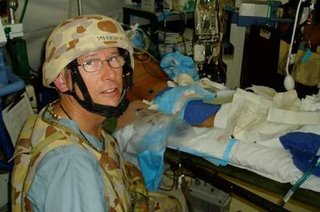 From the point of view of the Australian Defence Association, the country’s current military commitments underscore their belief that the military is under-resourced.
From the point of view of the Australian Defence Association, the country’s current military commitments underscore their belief that the military is under-resourced.For those of us concerned at the potential for new conflicts, such as the US hard line on Iran, seeing the military with their hands full is great news.
(picture: Reserve Group Captain George Merridew on disaster preparedness)
A Sydney Morning Herald report gives some more insight into the constraints on any further commitment to Bush’s plans.
Australia's defence force is being stretched to the limit by the current deployment of warships to northern waters, according to the Australia Defence Association.
Amphibious transport ships HMAS Kanimbla and HMAS Manoora are currently heading north, ready to be called into service if East Timor requests assistance.
Prime Minister Howard has refused to confirm whether Australia could send 1,000 troops into East Timor, its biggest deployment since leading a peace mission in the fledgling country in 1999.
With a total of about 2,500 Australian troops currently stationed in the Middle East, Afghanistan and the Solomon Islands, Australia Defence Association executive director Neil James claims Australia's defence force was running at full capacity.
James is quoted as saying: "There's no doubt that elements of the defence force are stretched, particularly, for example, capabilities like infantry.
"But they're not yet overstretched and we're certainly not in the area of operational strain."
Despite the Howard government’s rhetoric on Australia’s vulnerability to terror attacks, the real under-resourcing issue in a potential inability to cope with a disaster situation.
Group Captain George Merridew told a scientific meeting in Adelaide that the nation's civilian medical services were critically under-resourced.
Dr Merridew, an Australian Defence Force reservist was medical director of intensive care at a US Air Force hospital north of Baghdad in Iraq last year.
He says injured people would be left to die because of Australia's lack of preparedness for a major terrorist attack or tsunami-level disaster.
He called for formal agreements involving state and federal governments to be put in place to pay private hospitals to provide excess capacity at short notice.
Private hospital surgeons and staff also would have to be compensated because in a major disaster significant numbers would be uninsured or non-national.
"Instead of total chaos and no way of knowing how any of this could be done, suddenly there is a way. You have half-a-dozen to start with, put them on the first train and off they go. Over the next week it would be easy in principle to send up another 50."

No comments:
Post a Comment